Understanding Psychoeducation: Foundation for Lasting Change
Psychoeducation is a structured therapeutic approach that involves systematically sharing crucial knowledge about addiction and mental health disorders. By integrating emotional and motivational elements, it aims to increase insight, foster coping skills, and promote treatment adherence. Recognized as a vital component of addiction recovery, psychoeducation empowers individuals and their families, laying the groundwork for sustained behavioral change.
Principles and Practices of Psychoeducation in Addiction Recovery
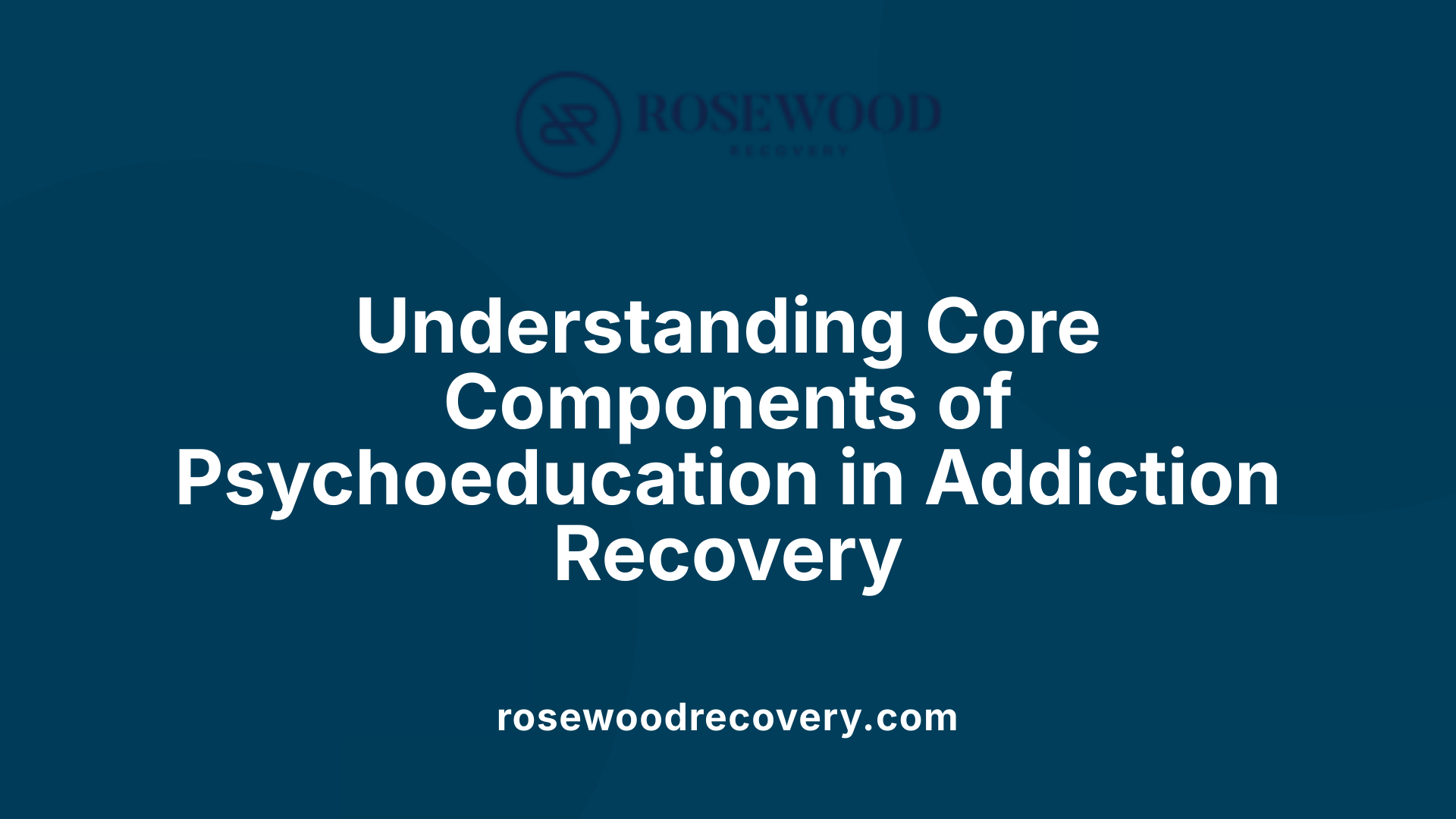
What are the core components of psychoeducation in addiction recovery?
Psychoeducation in addiction recovery comprises several essential elements designed to support individuals and their families through the understanding and management of addiction. The primary focus is on providing comprehensive information about what addiction is, its biological and psychological mechanisms, and its impact on behavior and relationships. Educating clients about the neurocognitive effects of substance use, including changes in brain circuitry related to reward, stress processing, and impulse control, helps demystify symptoms and reduce stigma.
Another vital component involves teaching problem-solving skills specifically tailored to managing cravings, recognizing triggers, and developing resilience against relapse. Communication skills training enables individuals to articulate their needs, set boundaries, and foster supportive relationships. Assertiveness training, in particular, empowers clients to confidently refuse substances and advocate for their recovery.
Psychoeducation also emphasizes the involvement of family members or significant others. Families are educated about the nature of addiction, treatment expectations, and ways to provide effective support. This collaborative approach creates a nurturing environment conducive to long-term sobriety, making psychoeducation a cornerstone of comprehensive addiction treatment.
Neuroscience-Informed Psychoeducation: Bridging Brain Science and Recovery
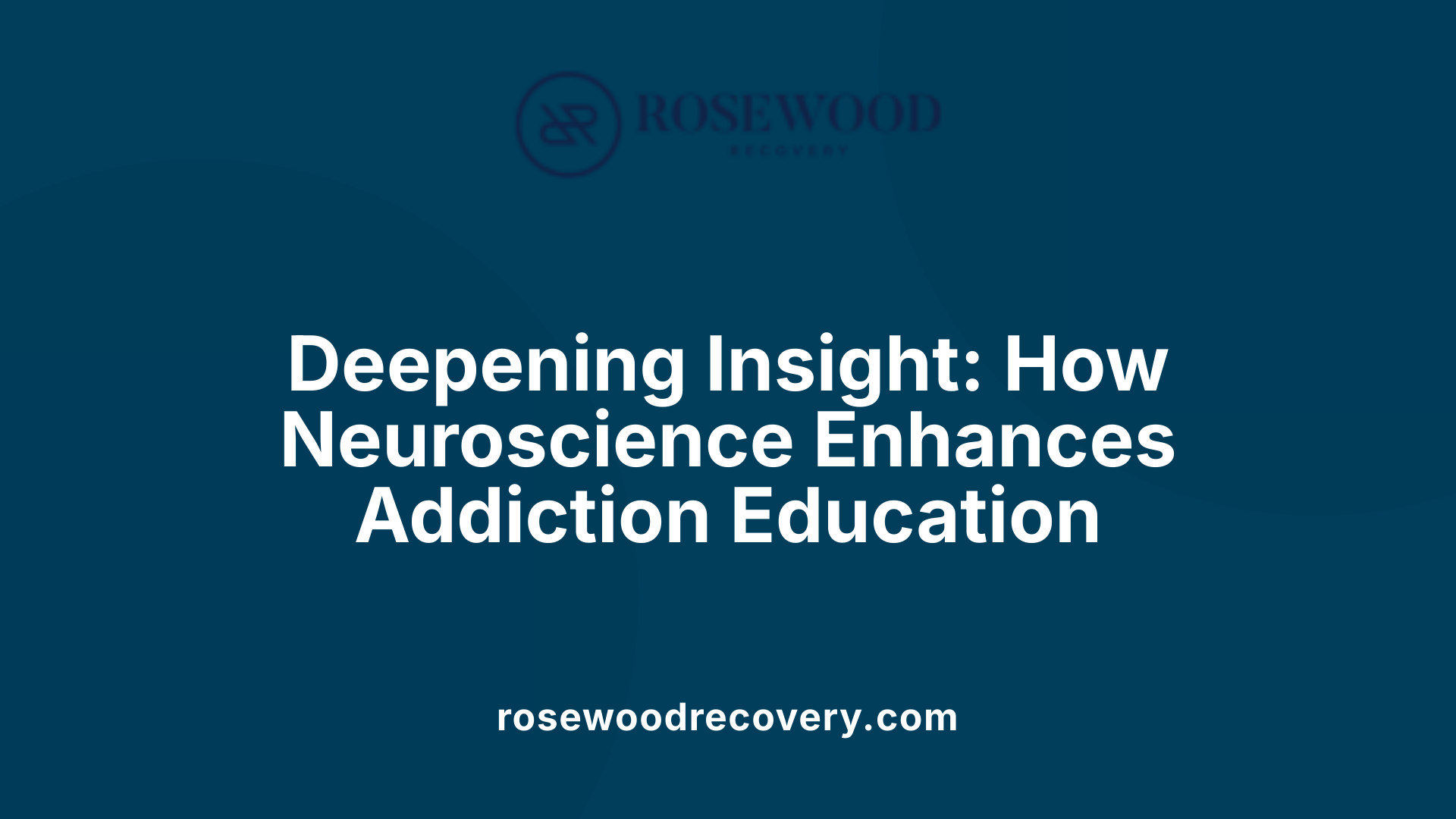
How have recent advances in neuroscience deepened our understanding of addiction’s neural mechanisms?
Recent progress in neuroscience has significantly enhanced our comprehension of the brain processes involved in addiction. Researchers now understand that addiction affects multiple neural circuits responsible for functions like reward, stress regulation, decision-making, and self-control. Key systems such as the Reward Circuit, including the nucleus accumbens and ventral tegmental area, underlie the craving and reinforcement aspects of substance use.
Further, other networks like the Default Mode Network (DMN), involved in self-awareness and introspection, and the Salience Network, which detects emotionally significant stimuli, play roles in addiction behaviors. The Executive Control Network, which facilitates decision-making and impulse control, often becomes impaired.
These insights are based on discoveries of toxicity effects, tolerance development, withdrawal symptoms, dependency mechanisms, craving triggers, and relapse pathways. Tools like the Research Domain Criteria (RDoC) framework help map these brain functions systematically, providing a biological basis for understanding addiction severity, resilience, and treatment response.
How is neuroscience integrated into psychoeducational content to boost motivation and reduce stigma?
Incorporating neuroscience evidence into psychoeducation transforms how individuals understand addiction, shifting perception from moral failure to a brain disorder. Explaining neural circuitry involved in reward, stress processing, and neurocognitive deficits helps demystify symptoms, making them more comprehensible and less stigmatized.
This knowledge empowers individuals by highlighting that addiction is rooted in brain changes, which are often reversible with appropriate treatment. It can motivate commitment to recovery by showing the brain’s capacity for recovery and resilience. Additionally, emphasizing the neurobiological processes helps normalize symptoms like cravings and cognitive impairments, reducing shame and self-blame.
Neuroscience-informed psychoeducation also fosters emotional acceptance and encourages active participation in treatment, bridging gaps in insight that are common in disorders like alcohol and substance use. By educating about brain recovery timelines and how medications and behavioral therapies influence neural healing, patients gain a clearer understanding of their journey.
What educational topics are featured in neuroscience-informed psychoeducation?
Key topics include:
- Neural circuitry involved in reward, involving dopamine pathways and the limbic system.
- Brain regions responsible for stress and emotional regulation, such as the amygdala and prefrontal cortex.
- Neurocognitive deficits caused by substance use, including impairments in memory, decision-making, and impulse control.
- The timeline for brain recovery post-abstinence, emphasizing plasticity and resilience.
- The effects of medications on neural pathways to support recovery.
- Stress and cue-induced cravings, illustrating the neural basis of triggers.
- The role of mindfulness practices in modulating brain activity related to cravings and stress.
- Lifestyle factors, such as sleep, nutrition, and physical activity, that influence brain healing.
How do multimedia platforms and interactive tools innovate neuroscience-based psychoeducation?
Innovative programs leverage multimedia tools, such as cartoons, apps, and interactive modules, to enhance engagement and learning. For example, the Brain Awareness for Addiction Recovery Initiative (BARI) utilizes animated cartoons based on neurocognitive models to illustrate addiction symptoms, brain recovery processes, and exercises.
Visual and humorous content are especially effective, capturing attention, aiding memory retention, and promoting self-awareness. These tools make complex neuroscience concepts accessible and engaging, particularly for youth and adolescents.
Digital platforms like the Neuroimaging Program for Adolescents (NIPA) incorporate interactive games, quizzes, and exercises that reinforce understanding while fostering motivation. These approaches also allow patients to visualize their brain's recovery process, maintain interest, and feel empowered.
Furthermore, such tools facilitate remote learning and continuous reinforcement of knowledge, crucial for maintaining motivation and adherence to treatment plans.
| Aspect | Content | Additional Details |
|---|---|---|
| Neural Systems | Reward, Stress, Executive Control | Basis for cravings, decision-making, control |
| Educational Methods | Cartoons, Apps, Interactive Modules | Enhance engagement, memory, and motivation |
| Topics Covered | Brain Recovery Timeline, Medication Effects, Triggers | Promotes understanding of treatment processes |
| Innovative Examples | BARI, NIPA | Use neurocognitive models, multimedia |
This integrative approach, combining neuroscience, psychology, and modern technology, offers a comprehensive framework that supports effective addiction recovery. It fosters understanding, resilience, and proactive self-management, transforming traditional psychoeducation into a potent tool aligned with the latest brain science.
The Power of Visuals and Interaction in Psychoeducational Programs
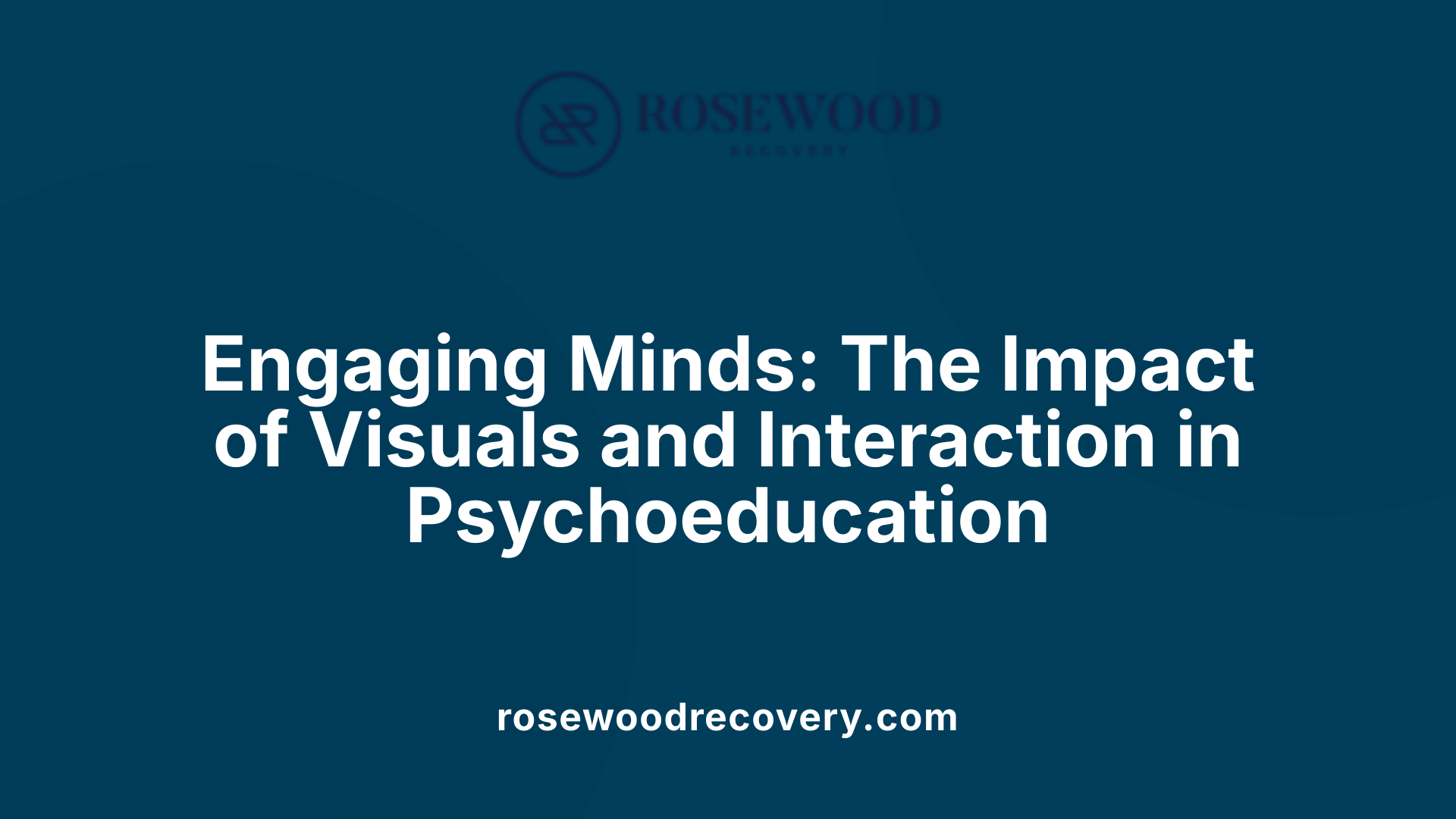
How does psychoeducation support relapse prevention and skill development?
Psychoeducation plays a vital role in preventing relapse and building essential coping skills in individuals recovering from addiction or mental health issues. By systematically providing comprehensive information about the nature of their condition—including triggers, symptoms, and treatment options—clients are better equipped to understand their challenges.
This educational approach enhances self-awareness, allowing individuals to recognize early signs of relapse, such as emotional distress or environmental cues. It also teaches practical coping strategies like managing cravings, practicing mindfulness, and employing emotion regulation techniques. These skills enable clients to navigate high-risk situations more effectively.
Moreover, psychoeducation fosters problem-solving abilities and strengthens communication skills, which are crucial for maintaining social support systems. Building a strong support network is often associated with improved recovery outcomes. Through targeted education, clients develop confidence and self-efficacy, empowering them to make healthier choices and adhere to treatment plans.
Learning about their condition helps reduce feelings of shame and stigma, encouraging ongoing engagement with therapy and peer support groups. All these elements contribute to long-term relapse prevention by enabling individuals to proactively manage their recovery journey. Ultimately, psychoeducation equips clients with the knowledge and skills necessary for sustained well-being and resilience.
Family Involvement and the Broader Impact of Psychoeducation
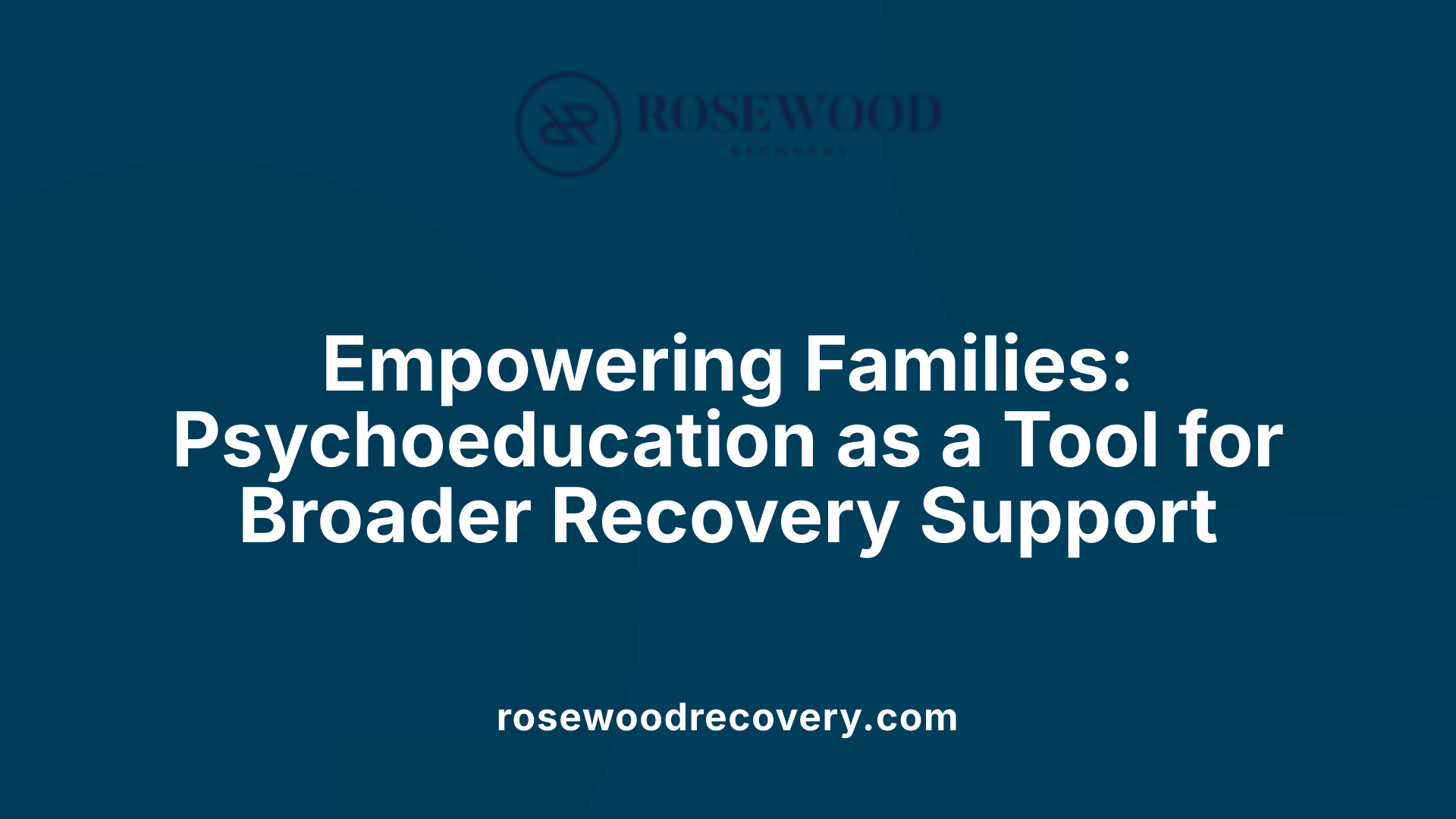
How does psychoeducation assist individuals and families in the recovery process?
Psychoeducation plays a vital role in supporting recovery by equipping both individuals and their families with essential knowledge about mental health and addiction. By explaining the biological, psychological, and social influences on addiction, it helps demystify the condition, reducing feelings of shame or stigma that can hinder recovery.
Educational content covers topics such as how addiction impacts the brain, common triggers for relapse, and effective coping strategies, empowering clients to take an active role in their healing process. Families and caregivers, when involved, gain insights into the nature of addiction, allowing them to offer informed emotional support and better communicate with their loved ones.
Furthermore, psychoeducation teaches early warning signs of relapse or crises, enabling timely intervention. This proactive approach fosters a collaborative environment where clients feel supported and understood, rather than judged or misunderstood. It also enhances self-efficacy, as clients and families learn problem-solving skills to manage stress, cravings, and emotional difficulties.
Overall, psychoeducation enhances insight, supports adherence to treatment plans, and builds resilience. It helps create a supportive environment crucial for sustained recovery, reduces relapse risks, and strengthens the familial and social support systems that are essential for long-term mental health stability.
How does psychoeducation improve communication, emotional support, and collaborative recovery efforts?
Effective psychoeducation encourages open dialogue and shared understanding between clients, families, and health professionals. By providing clear, accessible information using strategies like visual aids and interactive discussions, it helps bridge communication gaps that often exist due to stigma, misconceptions, or emotional barriers.
Families learn to recognize emotional cues and behavioral signs associated with recovery challenges, fostering empathy and patience. This shared understanding promotes more compassionate support, reduces misunderstandings, and encourages a team-like approach to recovery.
Additionally, psychoeducation inspires collaborative goal-setting, where clients and families work together with professionals to develop realistic, personalized treatment goals. This cooperation enhances motivation and commitment, making recovery efforts more effective.
Educational programs also empower families to reinforce positive behaviors at home, provide emotional comfort, and manage stress constructively, creating a more resilient and nurturing environment.
What is the role of psychoeducation in reducing relapse risk within family systems?
Relapse prevention is a central aim of psychoeducational interventions. When families understand the complex nature of addiction—its triggers, warning signs, and consequences—they become adept at identifying early indications of relapse.
Psychoeducation helps families develop strategies to effectively respond to these warning signs, whether through increased communication, emotional support, or seeking professional help promptly. It also emphasizes maintaining a stable, supportive household environment, which can psychologically buffer against stressors that often precipitate relapse.
Moreover, involving families in relapse prevention education fosters a sense of shared responsibility and accountability. It transforms the family into an active partner in maintaining sobriety, providing ongoing motivation and reinforcement for the client.
Research supports that comprehensive psychoeducational family programs significantly lower relapse rates by creating a cohesive support system, encouraging healthy dynamics, and promoting resilience against setbacks.
| Aspect | Impact | Details |
|---|---|---|
| Knowledge transfer | Reduces confusion, stigma | Clear understanding of addiction mechanisms and treatment |
| Emotional support | Enhances empathy, patience | Families better support emotional well-being of clients |
| Communication | Fosters openness, honesty | Improved dialogue, early crisis detection |
| Coping strategies | Builds resilience | Skill development for managing triggers and cravings |
| Relapse prevention | Lowers relapse risk | Recognizing early signs, coordinated response |
| Family involvement | Strengthens recovery networks | Active participation in treatment planning |
| Long-term benefits | Sustainable recovery | Ongoing education and mutual support |
Incorporating psychoeducation within the broader framework of addiction recovery underscores its transformative potential. When families are engaged and informed, the environment becomes more conducive to lasting change. As part of a comprehensive treatment plan, psychoeducational programs contribute not only to individual healing but also to creating resilient communities characterized by understanding, hope, and mutual support.
Enhancing Long-term Recovery Through Education and Support
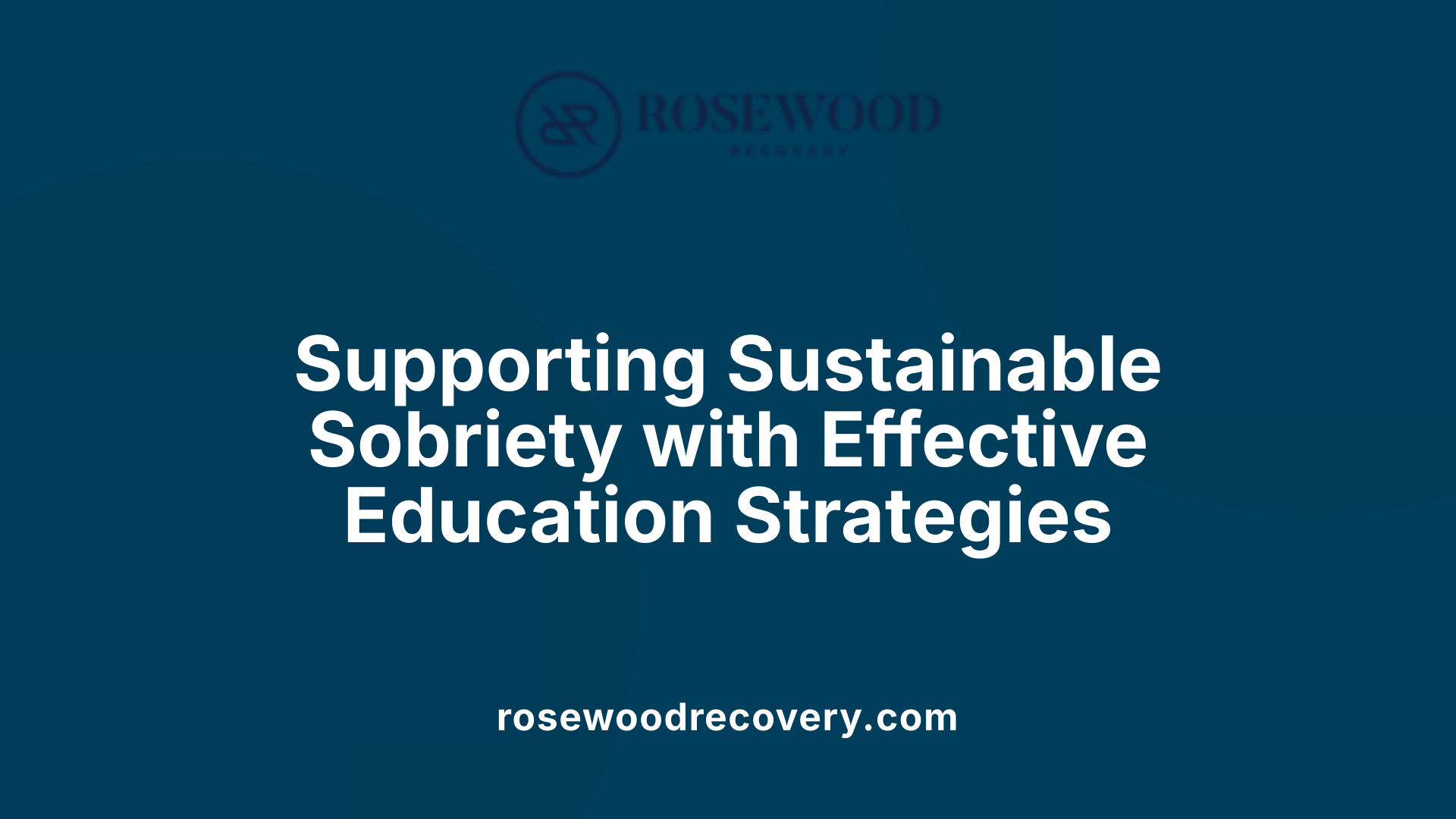
What are the general therapeutic advantages of psychoeducation in addiction recovery?
Psychoeducation provides numerous benefits that support individuals in their journey to long-term sobriety. It enhances understanding of addiction as a complex interplay of biological, psychological, and social factors. This clarity fosters motivation and engagement, making treatment more effective.
A key advantage is that psychoeducation equips individuals with practical coping skills. These include managing stress, recognizing triggers, and regulating emotions—crucial steps in avoiding relapse. By understanding how substances affect the brain and behavior, clients can develop personalized strategies to maintain sobriety.
Families also benefit through improved communication and support. Psychoeducation helps loved ones identify early warning signs of relapse, understand the challenges faced by those with addiction, and contribute constructively to recovery efforts.
The process of education dispels misconceptions about addiction, reducing stigma and fostering a supportive environment. It encourages healthier lifestyle choices, including adherence to medication, participation in support groups, and engagement in wellness activities.
Collectively, these advantages empower individuals, providing them with knowledge and skills that are vital for sustained recovery. It creates a foundation for resilience, self-efficacy, and lifestyle modifications that support long-term mental health.
Methods like group therapy, individual sessions, and family programs bolster learning and adherence.
Different therapeutic settings reinforce psychoeducation effectively. Group therapy sessions, typically lasting 60 to 90 minutes, offer a safe space for shared experiences. Participants learn about addiction science, relapse prevention, and coping strategies through interactive discussions, role-playing, and peer support—which promote engagement and normalize struggles.
Individual psychoeducational sessions focus on personalized issues, enabling tailored discussions on triggers, stress management, medication use, and emotional regulation. These sessions foster a trusting environment where clients can explore their unique barriers and craft customized plans.
Family programs involve psychoeducation for loved ones, aiming to strengthen social support networks. Families learn about the neurobiological aspects of addiction, the importance of communication, and strategies to support recovery while addressing relationship dynamics.
These formats—group, individual, and family—are often integrated into comprehensive treatment plans, ensuring consistent reinforcement of knowledge and skills.
Why is ongoing education and community support critical for maintaining sobriety?
Recovery is a continuous process that extends beyond formal treatment. Ongoing education keeps individuals updated on new insights about addiction, relapse prevention techniques, and wellness strategies. It helps maintain the motivation to stay sober and adapt to life's evolving challenges.
Community support structures play an essential role in sustaining recovery. Peer-led support groups, community resources, and social networks provide emotional encouragement, accountability, and shared understanding. These environments foster resilience by reducing feelings of isolation and stigma.
Educational initiatives like relapse awareness workshops and wellness programs promote lifelong learning and skill-building. They help individuals recognize early warning signs of relapse, adjust coping techniques, and seek help promptly.
Integrating community-based activities, such as alumni groups or sober living communities, reinforces the importance of a supportive environment. Being part of a community that encourages healthy behaviors fosters a sense of belonging, purpose, and accountability—factors that significantly increase the likelihood of sustained sobriety.
Summary Table
| Aspect | Description | Benefits |
|---|---|---|
| Types of Therapy | Group, individual, family programs | Reinforce learning, personalize support, strengthen relationships |
| Educational Content | Addiction neuroscience, relapse prevention, coping skills | Enhanced understanding, reduced misconceptions, empowerment |
| Support Networks | Community groups, peer support | Ongoing motivation, accountability, reduced isolation |
| Long-term Strategies | Continued education, skill development | Sustained sobriety, resilience, improved mental health |
By combining these educational and community-based approaches, treatment programs can significantly improve long-term recovery outcomes, empowering individuals to lead healthier, substance-free lives.
Fostering Empowerment and Resilience for Lasting Recovery
Incorporating psychoeducation into addiction recovery strategies offers a powerful avenue to enhance treatment outcomes and promote enduring sobriety. By bridging scientific discoveries—especially neuroscience—with practical therapeutic techniques, psychoeducational programs educate, motivate, and equip individuals with vital skills. These programs not only improve understanding of addiction’s biological, psychological, and social dimensions but also foster self-awareness, resilience, and active participation in recovery. When family members are involved, the supportive environment becomes even more potent, reducing relapse risks and strengthening social support networks. As research continues to validate its effectiveness, psychoeducation remains a cornerstone of holistic and personalized addiction treatment, empowering individuals to reclaim their lives and sustain their recovery.
References
- Neuroscience-informed psychoeducation for addiction medicine
- Psychoeducation for Addiction and Mental Illness - Summit Malibu
- The principles and practices of psychoeducation with alcohol or ...
- What is Psychoeducational Therapy? - Liberty House Recovery Center
- Psychoeducation For Substance Abuse - Silvermist Recovery
- How Psychoeducation Aids Addiction Recovery
- Psychoeducation & Skill Development for Relapse Prevention

.jpeg)
.jpeg)

